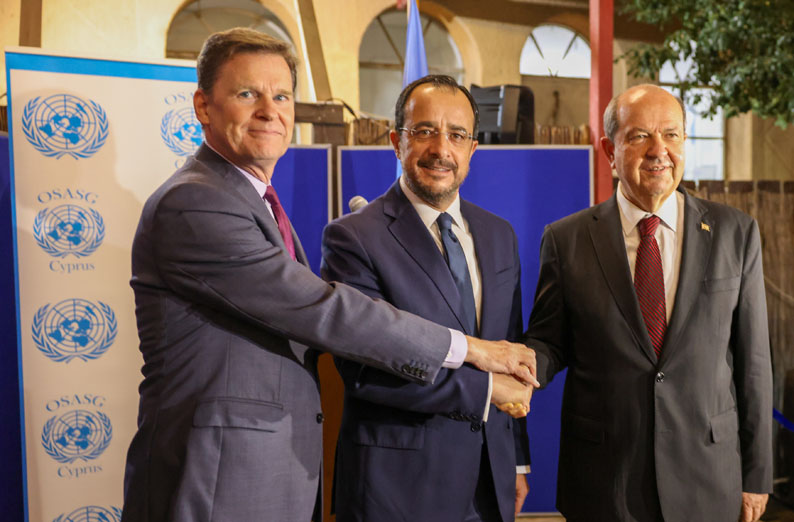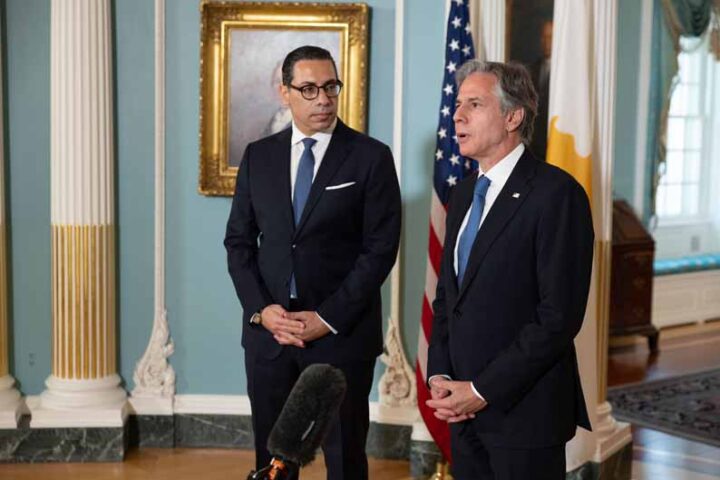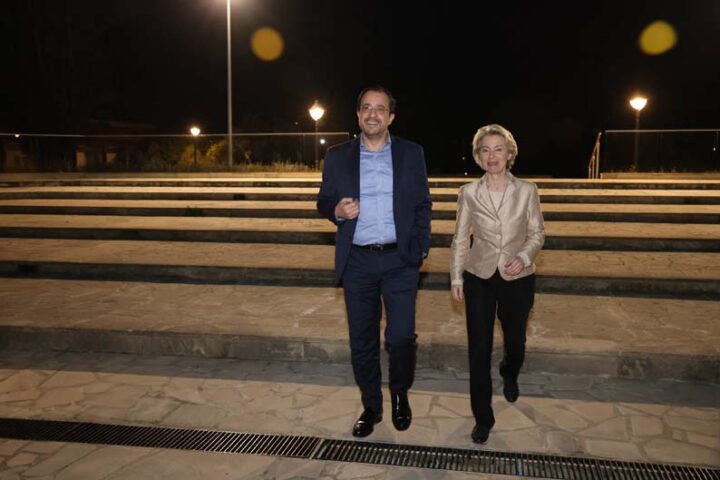To mark the appointment of a new UN envoy, but one who will not be presiding over the resumption of new negotiations to solve the Cyprus problem, this is a rather long recommendation on how to address the structural defect in the current negotiations process in a way that ensures that the outcome, whatever it is, can be supported by the leaders and has democratic legitimacy.
Summary of key points
- Why the current process is structurally defective.
- Why the piecemeal approaches so far can never be enough.
- When the voters don’t trust the politicians, it is time to bring them in.
- Addressing the specific Cyprus context.
- What if the answer is partition?
Two men with an eye to re-election: the key structural defect—
Imagine three, or potentially five, men in a closed room with the blinds drawn. Four of them got there because they were elected by popular vote among different constituencies of voters. Each vote was supported by a range of political forces.
Most of the burden falls on two of the men, the Greek Cypriot and the Turkish Cypriot. They face a difficult decision—the most difficult decision in their political lifetimes and the most consequential for each of their respective constituencies.
The truly independent opinion polls—not those that might be fed to them by those with bad intent—could even say that the public actually are ready for this difficult deal. However, some of the key political parties who helped them into power, or in the case of the Greek Cypriots sit on the National Council, are definitely not ready.
Even if one gives them the benefit of the doubt and assumes that both leaders do want a comprehensive settlement of the Cyprus problem, what do they do? Say ‘yes’ and potentially lose power? Or say ‘no’ and retain power?
This scenario is the key structural defect at the heart of the traditional process to solve the Cyprus problem. Even when you have two leaders who are in favour of a settlement, the current process design puts too much of the burden on the shoulders of two men facing re-election. It relies far too little on meaningful engagement with the general public, who will be the most affected by the huge changes. It is of course doomed to fail. And so it has, again and again, for at least five decades.
Below are some ideas for how to address this. But first let me delve into more reasons why the current process is inadvertently designed to fail.
—which leads to too high a dependence on the international community
The two-elected-men-in-a-room process leads to other structural problems. For example, as the ultimate decision is on the shoulders of two men, it relies far too heavily on a whole line-up of outsiders from the international community to be “on the ball” enough to support it intelligently.
You need a fully engaged and smart UN envoy. You need diplomats of key countries who are switched on enough to offer carrots and apply pressure at key moments. You need the EU to be savvy enough to throw money at it. All at the same time.
The chances of lining up committed Greek Cypriot and Turkish Cypriot leaders, supportive guarantor powers (Greece, Turkey and the UK), a smart UN envoy and a geopolitically savvy EU are very low. It is another reason why the process always fails.
A “big bang” solution raises the bar for success
A third structural defect is the aim for a “big bang”: immediate implementation of the settlement the day after twin referendums.
In 2004, if the Greek Cypriots had voted in favour of the Annan Plan, as 65% of Turkish Cypriots did, the massive change in the constitution would have been implemented from Day 1.
The same would have been true if there had been a deal at Crans Montana in 2017, with the additional challenge of immediately bringing the Turkish Cypriot economy into the eurozone. The “big bang” approach makes a solution more scary. It therefore raises the bar for success.
The insistence on the big bang comes mainly from the Greek Cypriot side, which frets that a gradual process of rapprochement will lead to “recognition of the illegal pseudo-state”, or that anything other than immediate implementation will somehow create a nanosecond in which the Republic of Cyprus ceases to exist. The solution that I propose below also attempts to address this barrier.
Don’t ditch referendums, but think about how best to hold them
One answer that some give to the conundrum of two elected leaders making a difficult decision is to remove the requirement for twin referendums and just put it to the legislatures on both sides instead.
Ditching referendums altogether would not be wise. Opinion polls have shown consistently since at least 2004 that there is a “hard No” of around 20-25% in each community (and a “hard Yes” of similar size).
Some of that hard No on both sides is very well resourced. Those resources will be used to overthrow any agreement that has the slightest hint of lacking democratic legitimacy. A deal that is seen as “forced on the people” can never be a stable deal.
On the other hand, there is plenty of scope for thinking how to do referendums better. Some have suggested holding a “heads of agreement” referendum to give the leaders a mandate to finish the details of the deal; others have suggested a “confirmatory” referendum after the settlement has had time to work. Either way, the public needs plenty of time to digest the referendum question and plenty of resources to make an informed decision.
So, how does one share the burden that falls on the shoulders of the two leaders, in a way that also has democratic legitimacy and which thereby secures a sustainable deal? The answer is to broaden participation in the process: to democratise it. And to do it in a very well resourced, professional way.
Piecemeal efforts will never be enough
We already know from opinion polls that citizens feel uninformed about the Cyprus problem negotiations when they are under way. This is despite the fact that one side in the negotiations has regularly and persistently leaked the details of “secret talks”.
While these leaks damage the process because they make the other side reluctant to give ground, I also see them as an indirect recognition by the leaking side that the public needs to be engaged in the process.
This need has been recognised by the international community. There have been efforts of the UN, as well as certain permanent and non-permanent members of the Security Council, to try and broaden the process, for example by lobbying to insert language into UN Security Council Resolutions (UNSCRs) on Cyprus.
 However, these make extremely slow progress. To give one example, recognising the now growing evidence that involving women in peacemaking supports both achieving peace deal and making it sustainable, in October 2000 the Security Council adopted the landmark resolution, UNSCR 1325. However, the first mention of women in UNSCRs on Cyprus did not come until 2011, with Resolution 2026/11.
However, these make extremely slow progress. To give one example, recognising the now growing evidence that involving women in peacemaking supports both achieving peace deal and making it sustainable, in October 2000 the Security Council adopted the landmark resolution, UNSCR 1325. However, the first mention of women in UNSCRs on Cyprus did not come until 2011, with Resolution 2026/11.
The Technical Committee on Gender Equality was not given the power to produce its recommendations “to ensure women’s full, equal and meaningful participation” until April 2023 and these recommendations have yet to be fully adopted by the two sides. Moreover, these incremental steps only happened at all because of a great deal of lobbying by the UN and certain permanent and non-permanent members of the Security Council.
What does this mean? It means that incremental changes in UNSCRs will not get us out of the abovementioned structural defect in the negotiations process, where two men in a room inevitably end up feeling they do not feel they have the public support that they need to make the very difficult decisions.
We need something more far-reaching.
When voters do not trust politicians—
So, what is the answer? The beginning of the answer lies in recognising more broadly that citizens already feel dissatisfied with politicians, that this is an existential risk to democracy, and that this therefore needs to change.
For example, in a Eurobarometer survey conducted in March 2023, only 10% of EU-27 respondents and 3% of (Greek) Cypriot respondents, were “very satisfied” with “the way democracy works” in their country; 51% of the EU-27 and 67% of Greek Cypriots were either “not very” or “not at all” satisfied. I would be very surprised if the results would be any better in the northern part of Cyprus.
It is therefore no surprise that larger political parties all over the democratic world are finding their support seeping away to smaller fringe parties, some of which have scant regard for democratic values. Bigger parties therefore have an interest in reversing that, even before considerations about the Cyprus problem.
—bring in the voters
How does one do this? Through a process known as “deliberative democracy”. Often conducted via citizens’ assemblies, the process typically picks 100-200 ordinary people from the general public, in a way that ensures they represent a cross-section of society.
Best practice is that participants are paid so that they can fully commit to the time. They spend many weeks hearing a range of views, from experts, from those affected by the issues, from those with different views, and so on, with the aim of coming to a consensus view on very tricky questions.
Ireland is the world leader in this, having conducted assemblies for highly sensitive questions, such as marriage quality in 2015 and abortion in 2018. I encourage you to watch this eight-minute video from The Economist which explains the basics of how citizens’ assemblies work.
Addressing the specific Cyprus context
Rolling out a citizens’ assembly in the context of the Cyprus problem will have a number of unique challenges. I am told that citizens’ assemblies are far more effective if they have the buy-in of the political leadership, who agree to abide by the recommendations. In Cyprus, that means two political leaders.
Getting the consent of leaders is difficult even with one leader. But one way to persuade them is that it can also help leaders’ popularity.
In the words of citizens’ assembly advocate Matthew Taylor in the abovementioned Economist video, “the biggest constraint on your power as a ruling politician right now is that the public doesn’t trust you. Actually, deliberation will give you more power because real power lies in having citizens on board.”
A second objection one frequently hears is that Cyprus is too small. Yet citizens’ assemblies have also worked in a number of local government contexts, including Washington State, where a citizens’ assembly came up with 148 recommendations on how to mitigate climate mitigation strategies “while strengthening communities disproportionately impacted by climate change across the State”.
 Another objection is that the political parties will try to “stuff” the assemblies with their own people, or that the assemblies will be full of people who are “too pro-solution” so unrepresentative, or that participants will come under public pressure, be “doxxed” and so on.
Another objection is that the political parties will try to “stuff” the assemblies with their own people, or that the assemblies will be full of people who are “too pro-solution” so unrepresentative, or that participants will come under public pressure, be “doxxed” and so on.
Another issue is that the assembly will need to be conducted in at least two languages with simultaneous interpretation (because confining it to English-speakers in Cyprus will be by definition exclusionary).
These are certainly very serious challenges and this is why any initiative needs to be extremely well resourced (we are talking millions, not thousands of euros) and probably needs to be under UN auspices, but with extremely experienced project designers and managers who also receive a great deal of input from those who understand the Cypriot political scene on both sides.
The good news is that there is now plenty of experience out there. As of 2021 there had been almost 600 recorded citizens’ assemblies across the world.
Another objection I have heard is that Ireland’s citizens’ assemblies were only on one issue, whereas in Cyprus, it would be more. At the very least, one can imagine that it might be the six “core core” issues of the Cyprus problem encapsulated in the Guterres Framework presented orally in 2017. However, as noted above, Washington State did not just tackle one simple question. Nor did France, which conducted a citizens’ assembly on end-of-life questions in 2023, issuing 67 recommendations.
What if the answer is partition?
Another objection is that an assembly might lead participants to decide that, after all, they don’t mind living as peaceful neighbours but they would rather live apart.
As I have spent much of the past 20 years both professionally and voluntarily trying to help put the country back together again, it is not an outcome I would want. But if that is what the assembly decides, and it is then put to twin referendums which also agree, it would have the democratic legitimacy to address qualms by EU countries, such as Spain and UN permanent members, such as China.
What I suspect (or perhaps hope) is more likely is that the citizens’ assembly on Cyprus decides in favour of a “step-by-step” approach to a solution. It makes practical sense and would give democratic legitimacy for this kind of approach to the Greek Cypriot leadership, which for reasons explained above has always been wary of this approach.
A step-by-step solution could ultimately lead to a united Cyprus or a divided Cyprus. But either way, it will have been done by democratic deliberation, not by force.
This is why deliberative democracy ought to be favoured by all political leaders, regardless of their positions.
In the words of University College Dublin Professor David Farrell: “the Citizens Assembly held the hand of the politicians, galvanised them, encouraged them, because what politicians admitted to was that they were listening to the voice of ordinary, informed ordinary citizens, and if that was what ordinary citizens felt needed to be done, then they were prepared to go down that road too.”
Further reading:
This subject is new for me too, so if you want to dive into it further here are a few links.
Citizens’ Assemblies: An Idea Whose Time Has Come (Again), by the Art of Association.
Assembling an Assembly Guide, by Democracy Next.
Good practice principles for deliberative processes for public decision making, OECD.
The Keys to Democracy: Sortition as a New Model for Citizen Power (Sortition and Public Policy, 13), Maurice Pope.
Fiona Mullen is Director of Sapienta Economics. She was very closely involved in the Cyprus negotiations from 2008 until early 2016, both as a staff member in the UN Good Offices in the intense Christofias-Talat period and as a consultant beforehand and afterwards.










